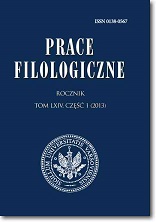Próba charakterystyki semantycznej wyrazu {nie} i zaimków nieokreślonych z cząstką {nie-} na podstawie słowników historycznych...
An attempt at formulating a semantic characteristics of the word {nie} and indefinite pronouns containing the particle {nie-}...
Author(s): Agnieszka Ewa PiotrowskaSubject(s): Language and Literature Studies
Published by: Wydział Polonistyki Uniwersytetu Warszawskiego
Keywords: morfemy; etymologia; {nie}; zaimki nieokreślone; morphemes; etymology; {nie}; indefinite pronouns
Summary/Abstract: The paper discusses etymology, meanings and syntactic functions of the word {nie} (‘no’), as well as of indefinite pronouns containing the formative {nie-} ({nieco, nieczyj, niegdy, niegdzie, niejaki, niejeden, niekaki, niekiedy, niekielko, niekto, niektóry, niekędy}) up till the 16th century. The author points to the fact that it is relevant to distinguish two formatives {nie-} (currently homonymous), i.e. 1. a part of nominal formations (e.g. {niemiły, niewola}) and 2. indefinite pronouns, descended from two separate Proto-Slavic morphemes ({*ne-} and {*ně-}). There used to be more affixes forming indefinite pronouns, and numerous among them contained the particle {nie-}; the contemporary Polish has retained the productive morphemes -ś and {-kolwiek}. Some pronouns among those that the author discusses were already recessive in the oldest period of the Polish language history, while the words {nieco, niejaki, niekiedy} and {niektóry} have been preserved up till today. The withdrawal of indefinite pronouns with the formative {nie-} was caused by (besides the vowel length disappearance and the compensatory heightening of the former long vowels, including {ě}) the impossibility to distinguish them from those with the particle {ni-}, and in some cases e.g. {nijaki, niktóry} the indefinite pronoun has semantically and phonetically merged with the negative pronoun.
Journal: Prace Filologiczne
- Issue Year: 64/2013
- Issue No: 1
- Page Range: 271-290
- Page Count: 20
- Language: Polish

